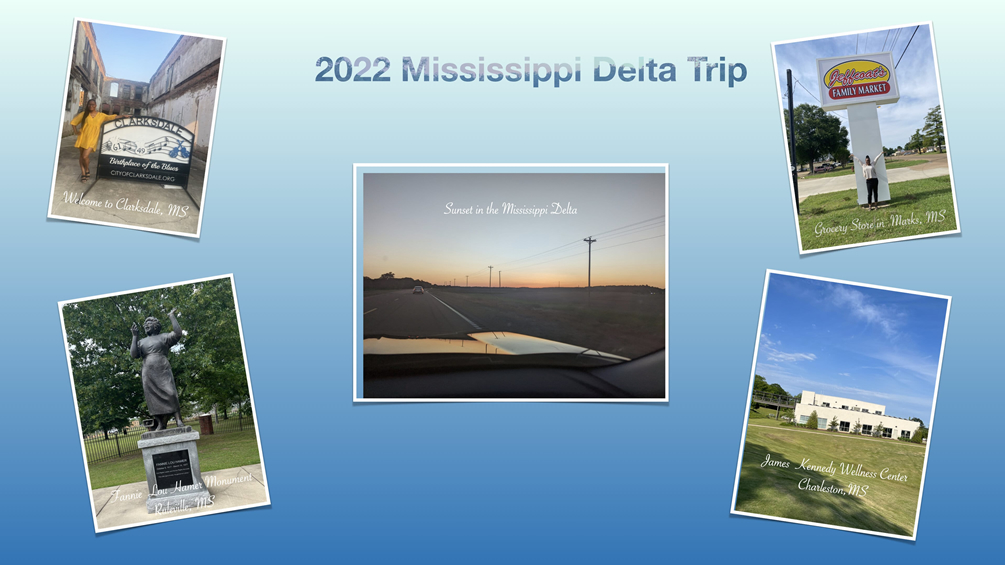Beyond the Classroom Walls

Jadrienne Horton
Health Behavior and Health Education & Social Work Student
All too often, students are taught new knowledge and skills in the classroom, but rarely are provided the opportunity to apply their comprehension of content outside of the classroom. Unless students seek out an experiential learning experience, outside of the classroom, they are not provided with the chance to apply what they learned in a realistic setting. However, during my Public Health 615: Public Health in Action: Mississippi course, I was able to engage in an hands-on applied learning experience that is impacting population health. I was provided with a safe and supportive learning environment that allowed me to hone skills and knowledge gained through this course and previous ones. I had the opportunity to be a part of an interdisciplinary team of public health professionals who, like me, were passionate about improving population health. Moreover, I was able to immerse myself in a new cultural setting different from what I am accustomed to. Prior to this experience, I had little familiarity with the state of Mississippi, much less the Delta region. However, after partaking in this week-long field experience, I have obtained newfound knowledge, skills, and admiration for the Mississippi Delta.
For this assignment, my colleagues and I were tasked with supporting evaluation efforts and aiding in the recruitment of already existing Food Prescription Programs in Tallachatie and Quitman Counties. For Quitman County, we interviewed grocery store owner stakeholders and participants to assess their understanding of the program. Given the small number of participants in the program, our main priority was to recruit residents to join the program. Recruitment took place at a local grocery store and two housing authorities within the city of Marks. I was a part of the groups that went to the housing authorities. Outreach included knocking on doors and screening potential participants who may be eligible for the program. At first, I was apprehensive about doing this. I did not know how residents would react to outsiders coming into their community. Many thoughts ran through my mind, such as, would they be receptive or how can we approach them without appearing threatening or suspicious? After receiving a pep talk from one of our professional support team members, I became confident that I could do this. By being genuine, personable and candid, I was able to not only recruit new participants, but meet some amazing people that welcomed me into their space.
In addition to assisting with recruitment efforts, I also facilitated focus groups, which I had learned about in my coursework, but never had the opportunity to apply in a real world setting. This was intimidating to me as well, because I wanted to adhere to the allocated one hour timeframe provided and for the group to understand me. However, once participants started discussing their experiences being in the program, I became more comfortable and intrigued by their stories and how they had been positively impacted by the Food Prescription program. I realized that I didn’t have to put on a professional facade, but by simply being myself, I was able to build rapport.
Prior to this experience, I had limited knowledge of the Mississippi Delta’s rich history of overcoming racial adversity and being the foundation for the blues genre. Some amazing civil rights activists, musicians, artists, actors and actresses and other professions have come from the Mississippi Delta community. For example, notable figures such as Jim Henson, the creator of Kermit the Frog, legendary blues musician BB King and civil rights activist Fannie Lou Hamer, who fought until her death for equal voting rights, food equality and other racial injustices in the African American community. Mississippi Delta natives have had to overcome some major obstacles to get where they are today. One word I would use to describe this community is resilient.
I am forever grateful for the experience I have had. Thank you to the University of Michigan and Mississippi coordinators, professors and other liaisons for coordinating this experience. Thank you for the gracious donors and sponsors who made this trip financially possible. And a special thanks to the Mississippi Delta community for welcoming me and my colleagues into your home. You have taught me so much and I will carry this experience with me for the rest of my life. Until next time!
